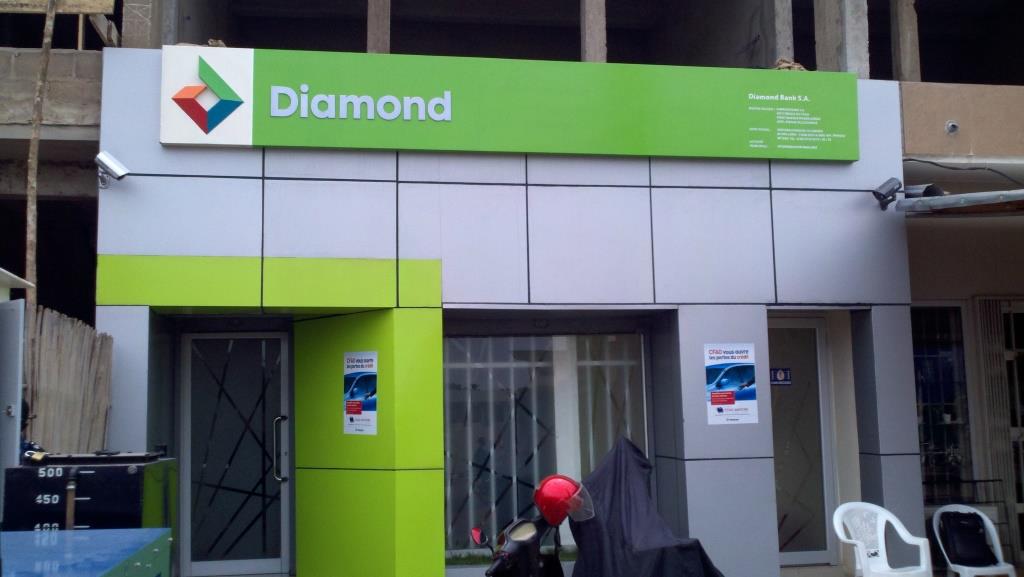Banking
Fitch Affirms Diamond Bank at ‘B-‘ With Negative Outlook

By Modupe Gbadeyanka
Fitch Ratings has announced affirming Diamond Bank Plc’s Long-Term Issuer Default Rating (IDR) at ‘B-‘ with the outlook negative. Also, Fitch affirmed all of Diamond’s other ratings.
The rating agency said Diamond Bank’s IDRs are driven by the bank’s intrinsic creditworthiness as defined by its Viability Rating (VR).
Diamond Bank’s VR considers its vulnerable asset quality. Loan impairment charges are consistently above peers and impaired loans as a percentage of gross loans was 9.6% at end-9M17, well above the sector average for rated banks, as reported under IFRS.
Reported impaired loans are not indicative of a very high level of problem loans. Around 20% of Diamond Bank’s loan portfolio is considered impaired under local prudential classification rules (90 days overdue). The bank has also restructured a sizeable proportion of its upstream oil portfolio.
Asset quality is indicative of the challenging operating conditions in Nigeria, including tight liquidity in both local and foreign currency. Tight liquidity dates back to the sharp fall in oil prices, which has adversely impacted asset quality sector-wide. Liquidity in foreign currency is particularly tight at Diamond Bank.
The bank holds almost $400 million of deposits from state oil enterprises, which should have been moved to the Central Bank of Nigeria (CBN) under new federal regulations, but Diamond Bank has been unable to meet this requirement given an acute shortage of dollars.
High loan impairment charges (averaging around 5% of gross loans per year) undermine solid pre-impairment earnings, which are the strongest among mid-sized and small Nigerian banks.
Strong pre-impairment earnings reflect a solid franchise, including a good base of retail deposits, providing a cheap local currency funding base. Cost efficiency is also stronger than peers.
The Negative Outlook on Diamond Bank’s Long-Term IDR reflects a precarious foreign currency liquidity position and pressure on capital from asset quality weakness.
Diamond Bank’s National Ratings are a reflection of its creditworthiness relative to the best credits in Nigeria.
Diamond Bank’s National Ratings consider generally weaker financial metrics than peers and the senior debt rating is in line with the Long-Term IDR and has a Recovery Rating of ‘RR4’ indicating average recovery prospects, Fitch said.
Fitch said in a statement that it believes that sovereign support to Nigerian banks cannot be relied on given Nigeria’s (B+/Negative) weak ability to provide support, particularly in foreign currency.
In addition, it noted that there are no clear messages from the authorities regarding their willingness to support the banking system. Therefore, the Support Rating Floor of all Nigerian banks is ‘No Floor’ and all Support Ratings are ‘5’. This reflects our view that senior creditors cannot rely on receiving full and timely extraordinary support from the Nigerian sovereign if any of the banks become non-viable, it said.
The rating firm said Diamond Bank’s IDRs are sensitive to a rating action on its VR and its VR is sensitive to a material weakening of liquidity, particularly in foreign currency. It is also sensitive to a sharp deterioration in asset quality that would erode capital and threaten the bank’s viability.
An upgrade of the bank’s VR would require a material improvement in the Nigerian operating environment and a significant improvement in the bank’s financial metrics.
An upgrade of Diamond’s IDRs may also result from sovereign support being factored into the bank’s ratings.
Banking
All Set for Second HerFidelity Apprenticeship Programme

By Modupe Gbadeyanka
Registration for the second HerFidelity Apprenticeship Programme (HAP 2.0) organised by Fidelity Bank Plc has commenced.
The Divisional Head of Product Development at Fidelity Bank, Mr Osita Ede, informed newsmen that the initiative was designed to empower women with sustainable entrepreneurship skills.
The lender created the flagship women-empowerment initiative to equip women with practical, income‑generating skills and structured pathways to entrepreneurship.
“HerFidelity Apprenticeship Programme 2.0 reflects our commitment to continuous improvement. Having evaluated feedback from the first edition, we have returned with stronger partnerships and deeper mentorship programmes to ensure that women acquire not just skills, but sustainable economic opportunities,” he said.
“At the heart of the programme is guided, real‑world learning. Participants will undergo intensive apprenticeship training under reputable institutions and industry experts across select fields such as hair styling, shoe making, auto mechatronics, and interior decoration,” Mr Ede added.
He noted that HerFidelity Apprenticeship Programme 2.0 goes beyond skills acquisition by offering participants a wide range of business advisory services. These include business and financial literacy training, mentorship support throughout the apprenticeship journey, access to Fidelity Bank’s women‑focused and SME financial solutions, as well as guidance on business formalisation and growth strategies.
Further emphasising the bank’s vision, Mr Ede said, “By integrating structured mentorship with entrepreneurial development, Fidelity Bank is positioning women not just as trainees, but as future employers, innovators, and economic contributors within their communities. This aligns with our mandate to help individuals grow, businesses thrive, and economies prosper.”
Banking
The Alternative Bank Opens New Branch in Ondo

By Modupe Gbadeyanka
A new branch of The Alternative Bank (AltBank) has been opened in Ondo State as part of the expansion drive of the financial institution.
A statement from the company disclosed that the new branch would support export-oriented agribusinesses through Letters of Credit and commodity-backed trade finance, ensuring that local producers can scale beyond state borders.
For SMEs, the bank is introducing robust payment rails, asset financing for equipment and inventory, and supply chain-backed facilities that strengthen working capital without trapping businesses in interest-based debt cycles.
The Governor of Ondo State, Mr Lucky Aiyedatiwa, represented by his Chief of
Staff, Mr Olusegun Omojuwa, at the commissioning of the branch, underscored the importance of financial institutions in economic development.
“The pivotal role of financial institutions to economic growth and development of any economy cannot be overemphasised. It provides access to capital, supporting small and medium-scale enterprises and encouraging savings.
“Therefore, I have no doubt in my mind that the presence of The Alternative Bank in Ondo State will deepen financial services, create employment opportunities and stimulate economic activities across various sectors,” he said.
In her remarks, the Executive Director for Commercial and Institutional Banking (Lagos and South West) at The Alternative Bank, Mrs Korede Demola-Adeniyi, commended the state government’s leadership and outlined the lender’s long-term vision for Ondo State.
“As Ondo State steps into its next fifty years, and into the future anchored on the sustainable development championed during the recent anniversary celebrations, The Alternative Bank is here to be the financial engine for that vision. We didn’t come to Akure to hang banners. We came to fund work, farms, shops, and factories.”
With Ondo State’s economy anchored largely on agriculture, particularly cocoa production, poultry farming, and other cash crops, alongside a growing SME and trade ecosystem, AltBank is deploying sector-specific financing solutions tailored to these strengths.
For cocoa aggregators, processors and poultry operators, the bank will provide production financing, facility expansion support, machinery lease structures, and structured trade facilities under its joint venture and cost-plus financing models, with transaction cycles of up to 180 days for commodity trades and longer-term structured asset financing for equipment and infrastructure.
The organisation is a notable national non-interest bank with a physical network now surpassing 170 locations, deploying capital to solve real-world challenges through initiatives such as the Mata Zalla project, which saw to the training of hundreds of women as electric tricycle drivers and mechanics.
Banking
Recapitalisation: 20 Nigerian Banks Now Fully Compliant—Cardoso

By Adedapo Adesanya
The Governor of the Central Bank of Nigeria (CBN), Mr Yemi Cardoso, announced on Tuesday that the country’s banking sector is making strong progress in the recapitalisation drive, with 20 banks now fully compliant.
Mr Cardoso disclosed this during a press conference at the first Monetary Policy Committee (MPC) meeting of 2026, where he also highlighted positive developments in the nation’s foreign reserves.
On March 28, 2024, the apex bank announced an increase in the minimum capital requirements for commercial banks with international licences to N500 billion.
National and regional financial institutions’ capital bases were pegged at N200 billion and N50 billion, respectively.
Also, CBN raised the merchant bank minimum capital requirement to N50 billion for national licence holders.
The banking regulator said the new capital base for national and regional non-interest banks is N20 billion and N10 billion, respectively.
To meet the minimum capital requirements, CBN advised banks to consider the injection of “fresh equity capital through private placements, rights issue and/or offer for subscription”.
Following the development, several banks announced plans to raise funds through share and bond issuances.
In January, Zenith Bank said it had raised N350.46 billion through rights issue and public offer to meet the CBN minimum capital requirement.
Guaranty Trust Holding Company Plc (GTCO), on July 4, said it had successfully priced its fully marketed offering on the London Stock Exchange (LSE).
In September, the CBN governor said 14 banks fully met their recapitalisation requirements — up from eight banks in July.
With one month to the central bank’s March 31, 2026, recapitalisation deadline, 13 Nigerian lenders are yet to cross the finish line.
Additionally, the governor noted that 33 banks have raised funds as part of the ongoing recapitalisation exercise, signalling robust capital mobilisation across the sector.
He stated that gross foreign reserves have climbed to a 13-year high of $50.4 billion as of mid-February 2026.
-

 Feature/OPED6 years ago
Feature/OPED6 years agoDavos was Different this year
-
Travel/Tourism10 years ago
Lagos Seals Western Lodge Hotel In Ikorodu
-

 Showbiz3 years ago
Showbiz3 years agoEstranged Lover Releases Videos of Empress Njamah Bathing
-

 Banking8 years ago
Banking8 years agoSort Codes of GTBank Branches in Nigeria
-

 Economy3 years ago
Economy3 years agoSubsidy Removal: CNG at N130 Per Litre Cheaper Than Petrol—IPMAN
-

 Banking3 years ago
Banking3 years agoSort Codes of UBA Branches in Nigeria
-

 Banking3 years ago
Banking3 years agoFirst Bank Announces Planned Downtime
-

 Sports3 years ago
Sports3 years agoHighest Paid Nigerian Footballer – How Much Do Nigerian Footballers Earn

















